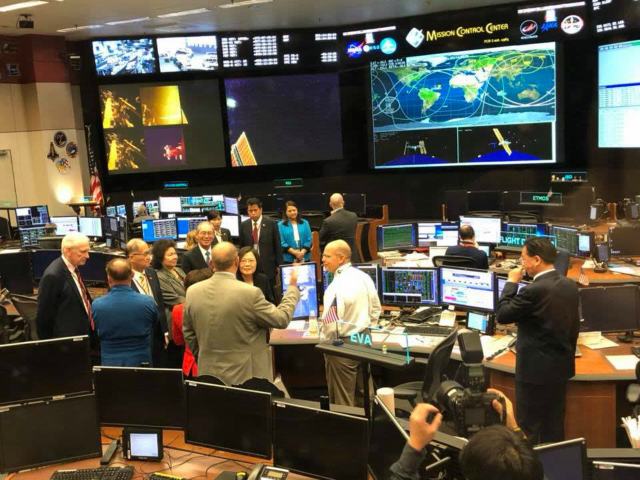Taiwanese President Tsai Ing-wen paid a visit to NASA’s fabled Johnson Space Center in Houston on Sunday, making her the first sitting president of Taiwan to visit an American government facility on U.S. soil. The Chinese were predictably outraged.
Until now, top Taiwanese officials have generally been hustled through “transitions” across American soil as if they were freight bouncing through a few FedEx depots on their way to overseas destinations. Media coverage of their visits was muted to avoid provoking Beijing, which insists Taiwan is a temporarily estranged province of China and its government lacks the full legitimacy of a nation-state.
The Japan Times impishly noted that when President Donald Trump signed the Taiwan Travel Act in March, China was upset by the prospect of high-level officials from Taiwan visiting the U.S. and vice versa, but the Chinese did not think President Tsai herself would be paying an official visit to one of the most famous U.S. government installations, accompanied by celebratory tweets from Taiwanese cabinet officials:
Tweets and pictures posted to the official account of the Taiwanese Foreign Ministry showed Tsai touring the iconic facilities and meeting NASA officials.
“#Houston, we’ve got a president! Couldn’t be more … proud. @iingwen is the 1st leader of #Taiwan to tour @NASA_Johnson during a #US stopover. Thanks @Astro_Ellen for helping realize this milestone moment. JW,” one tweet written by Foreign Minister Joseph Wu said.
The itinerary included the Mission Control Center and other facilities, Taiwan’s Central News Agency reported. Tsai stopped in Houston on the way home from a roughly weeklong tour of Central and South America.
“Great to visit Houston again! A big thank you to everyone who came all the way to welcome my delegation and attend the Taiwan expatriates banquet. This year’s event is the biggest we’ve ever hosted here. Your enthusiasm and support made me feel right at home!” Tsai herself gushed on Twitter.
“Astronaut Michael Fincke told me that the beautiful lights of Taiwan were visible from the space station passing over,” Tsai wrote on her Facebook page.
The Taiwanese president also visited the Ronald Reagan Presidential Library in Los Angeles, met with American lawmakers, and gave a political speech during her visit to the United States.
“In going abroad, the whole world can see Taiwan. They can see our country as well as our support for democracy and freedom. We only need to be firm, so that no one can obliterate Taiwan’s existence,” she said in her speech.
“China resolutely opposes any country with diplomatic ties with China, including the U.S., having official contacts with Taiwan,” the Chinese Foreign Ministry growled in response on Monday.
The Chinese government lodged formal protests against both Tsai’s speech at the Reagan Library and her visit to the Johnson Space Center. The U.S. State Department responded that neither event should be seen as a substantial change to U.S. policy towards Taiwan.
Politico on Monday quoted political science professor Wang Kung-yi of the Chinese Culture University in Taipei, who sized up Tsai’s trip as a carefully calibrated slap at Beijing that could have been much more forceful if she had stopped in Washington or New York City. As it stands, Wang said Tsai’s visit to NASA was a “breakthrough” compared with the previous treatment of Taiwanese leaders, but not a game-changer for America’s relations with either Taiwan or China.
“Tsai should realize that the Trump administration is playing the Taiwan card against China in the face of a widening row between Washington and Beijing over trade and other major strategic interests,” Wang advised.
Politico speculated Tsai’s Houston tour will be especially galling for China because Chinese scientists have been barred from working with NASA over the years, citing espionage concerns.

COMMENTS
Please let us know if you're having issues with commenting.